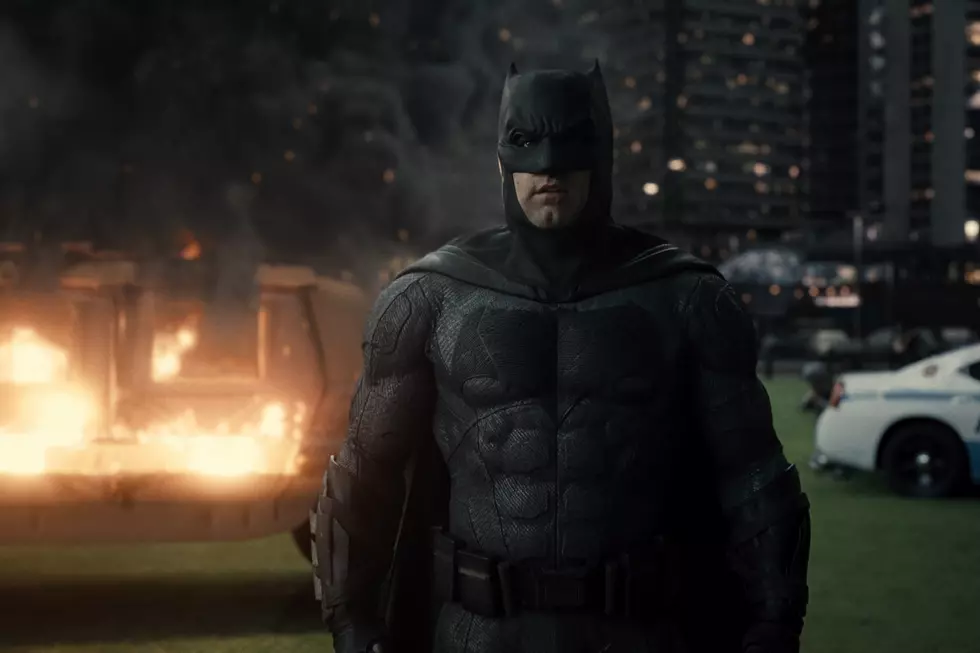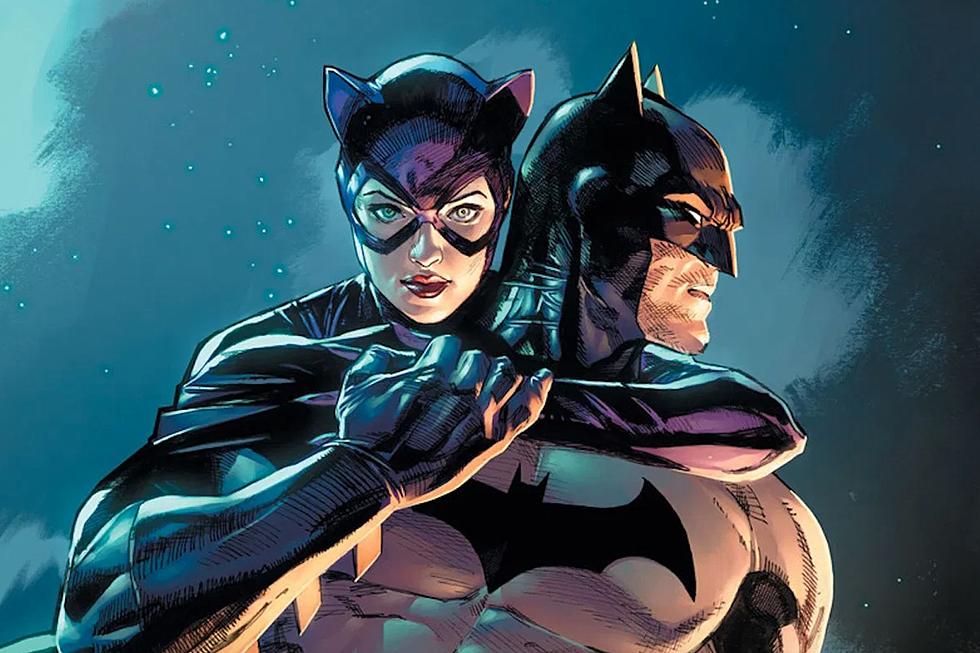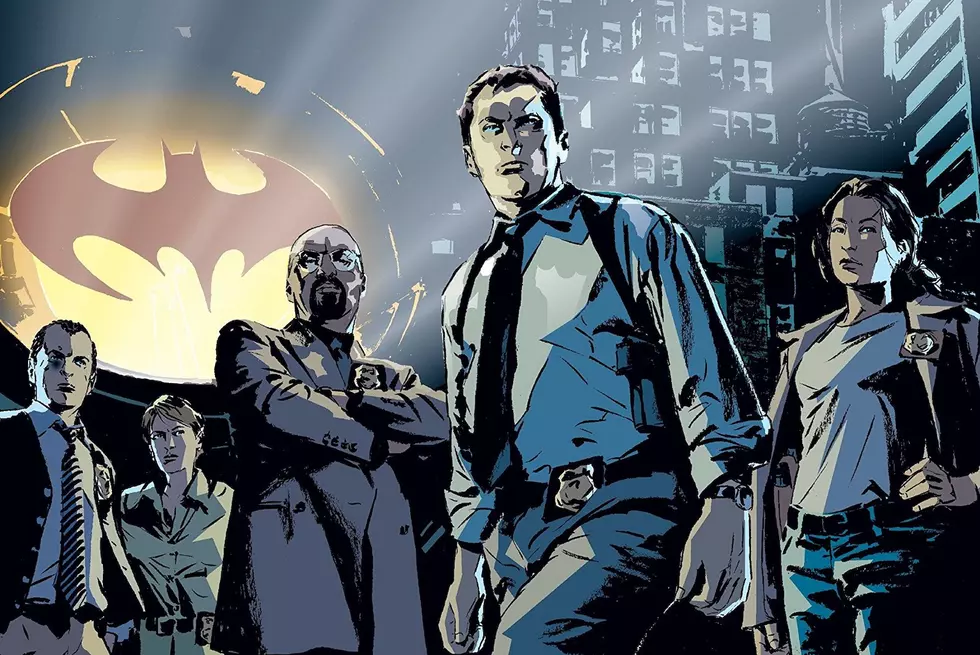
Ask Chris #182: The Butler Did It
Q: Where do you stand on the modern day love affair with "the toughening" of Alfred Pennyworth? -- @danceformyhorse
A: I've joked before about how I love Alfred more than most people love Batman, but let's be real here: that's only half-joking. Alfred is easily one of my favorite characters in comics, and I could happily read an entire series about the adventures of the Batman's Gentleman's Gentleman, even if it just focused on the problems of how to keep a robotic Tyrannosaurus and a giant penny from getting too dusty while cleaning up Batman's anti-crime basement. So believe me when I tell you, friends, the idea of a tough-as-nails Alfred Pennyworth is far from a modern invention.
Alfred's been a badass since day one.
Okay, well, maybe not quite since day one. He was, after all, introduced by Bill Finger and Jerry Robinson way back in 1943 as more of a comic relief character, an overweight, overstuffed amateur detective who inserted himself into Batman's life as equal parts nuisance and sounding board. After showing up at the mansion and basically demanding employment, which, to be fair, is a pretty baller way to go about getting a job, he impresses Batman and Robin by figuring out their identities, but even that just happens by accident. Before long -- after he lost the weight and grew the moustache to match the actor playing him in the serials, but before he lost the weird Claremontean highfalutin' accent -- he even got his own series of comedy strips where he bumbled his way through solving crimes mostly by accident.
That said, it was only a few years before they started filling in the pieces of Alfred's history, shaping him into someone who fit a little better into the growing family of characters waging an endless war on crime. It's part of the evolution of his character, something that's still going on today.
The reason it feels (to me, anyway) like Alfred has always been a two-fisted tough guy in his own right probably has a lot to do with the comics that got me started down my path of becoming the World's Foremost Batmanologist. The very first comic book I ever read was Mike W. Barr and Irv Novick's DC Comics Presents #83, when Alfred once again hulked out and turned into the Outsider, a creature so powerful that it took Superman, Batman, and the Outsiders to take him down. I say "once again" because this was actually a sequel to a story from the '60s where Alfred was killed off and then resurrected as a weird lumpy monster in underpants who tried to kill his former employer, something that I remember being covered pretty briefly, and that confused the heck out of me when I was 3. Still, it impressed on me the idea that under the right circumstances, Alfred could be a pretty threatening dude in his own right.
Then I read Untold Legend of the Batman, and any suspicions I might've had that Alfred was a total badass were confirmed with a vengeance.
I absolutely love Untold Legend. If you've never read it, it was one of a few short mini-series put out in the early '80s that was designed to catch new fans up on the pretty complex continuity behind these characters. Back then, you couldn't just type a character's name into Wikipedia and get a comprehensive history, and you were still years away from paperback collections. Even if you were actively following the comics, reading fanzines and picking up 80-Page Giants for the reprints of old stories, it's still pretty likely that you'd be missing bits and pieces of the story. Thus, Untold Legend and Secrets of the Legion of Super-Heroes, both of which were presented as a mystery that forced its principal characters to stand around talking about their past for three issues.
It's actually way more exciting than it sounds. Untold Legend in particular stands as one of my all-time favorite Batman stories, set up around a mystery of someone breaking into the Batcave, stealing Thomas Wayne's costume from "The First Batman," and destroying it before mailing the remnants back to Batman, all wrapped up with a strange and compelling psychological twist at the end, with Batman screaming at himself in a deathtrap of his own making. That this was one of the first comics I ever read, and that I read it all the time when I was a kid, probably shaped my tastes more than anything else. Seriously, check this page out:
When that's your formative image of Batman, you're probably going to grow up really liking comics where Jim Aparo draws that dude open-hand slapping jerks in disco suits into unconsciousness.
For our purposes today, though, the relevant part comes in the second issue, which, in addition to all the bat-slapping, goes into the history of Robin, the Joker, and Alfred:
That, folks, is Alfred Pennyworth liberating a concentration camp and then mowing Nazis down with a machine gun fired in one hand while the other has a fistful of barbed wire. That's hard. That's, like, Lee Marvin hard. And again, when that's your first real look at Alfred, when there's a comic that goes "hey, that guy who wears the tuxedo and makes chicken soup for Batman? Here's his origin story," that's an image that's going to stick with you. You don't really get more badass than that.
What I'm getting at here is that this was how Alfred worked in 1980, and all Untold Legend was doing was highlighting elements of the character that had been established years before. Even if it's just stuff that he did in the distant past, Alfred's been a badass for a long, long time.
It really makes sense that he would be, too. For all intents and purposes, Alfred is, after all, Batman's father figure -- I've written about this before, but that's the really interesting wrinkle to the story that Alfred brings in when he shows up. Batman is motivated by the loss of his parents, but part of the fantasy is that as an adult, he gets a new father, with the added bonus that this one is technically an employee that he can boss around so that he can stay up all night if he wants to. Robin is the first step in Batman rebuilding his family as an adult, but Alfred fills the role of a father, and a huge part of that is that he has to be able to take care of Batman.
That, ideally, is what parents do, right? They provide that sense of security and protection -- the same things that are taken away from Batman when Thomas and Martha Wayne are killed is exactly what he gets back when Alfred joins up. The thing is, the needs of a child are pretty vastly different from the needs of a man in a costume who sets out to end crime by throwing little metal bats at it every night. If we're going to buy into the idea that Batman is mortal and can be hurt, then he's not going to get the kind of injuries you can patch up with rubbing alcohol and a Hello Kitty band-aid, and if Alfred's going to be the one to fill that parental role, then his skillset is going to have to be ramped up as far beyond the average as Batman's. So he becomes a butler who just happens to also be an ex-secret agent with training as a combat medic. There's actually a kind of logic to it.
The trick is that as Batman himself evolves over time, Alfred has to change to keep up, which is why it seems like "badass Alfred" is a modern invention. A lot of the most visible Batman projects -- particularly the Nolan movies -- have shifted the focus away from Batman the adventuring crimefighter and more towards the gritty urban vigilante, and with that, you get an Alfred who's shifted along the same axis, especially if you take Robin out of the equation and leave Alfred as his only confidante. The same thing happens to Commissioner Gordon, although that's usually to a lesser extent; Gordon's role is usually less flexible than Alfred's just by nature of having to be rooted in the police department. That's how you get Michael Caine as an ex-SAS soldier talking about hunting down warlords in Burma, or the Jason Statham-esque Alfred of Beware the Batman:
Incidentally, aside from the thing with the guns (more on that later), I actually liked that take on Alfred a lot. Just as Batman can be different things depending on the story being told, it's nice to see a version of Alfred that we haven't really seen before either. There's a lot of interesting drama you can get from the idea of a big, physically imposing Alfred who has to publicly protect Bruce Wayne while also helping Batman behind the scenes, and I like the idea of a more working-class Alfred contrasted with the privileged (albeit tragic) Batman. Plus, JB Blanc's voice acting is really stellar.
The only thing I didn't care for about it, and something that adaptations of Batman into other media seem to be having an increasingly hard time with, is that he was a bodyguard and not a butler. I'll admit that there's a good chance that's because I can be a traditionalist in weird ways about this stuff, but I do think it changes the dynamic of those characters. It's not that Alfred necessarily has to be a "servant" -- that's something that's always going to be weird, even if Bruce Wayne is unimaginably rich -- but if you make him a bodyguard and then also make him a physically imposing character, and also keep the level of dedication to his duty that has always been at the heart of Alfred's character, it raises the question of why he's not out there in a costume himself taking bullets for his employer. A butler, even a badass butler who spent his youth gunning down Nazis in the war, isn't called upon to do that. A bodyguard is. It's a weird setup, and it can lead to some awkward shifts in how the characters work.
And nothing is more awkward, and nothing botches the characterization of Alfred as a tough guy harder than Batman: Earth One.
I have a pretty intense, visceral hatred for this one based mostly on the end, but I'll admit that in one way, it does a pretty decent job of bridging those two ideas of Alfred, the mild-mannered servant and the (former) badass assistant. Rather than skewing younger like Beware the Batman, Johns and Frank depict Alfred as an older man who also walks with a cane, hinting at an injury that keeps him out of action while also not necessarily stopping him from going tough when the occasion calls for it. In that respect, he's very reminiscent of Old Bruce Wayne in Batman Beyond, someone who has the potential to get into the action on occasion, without pulling the focus away from the character who's actually the star. The only bad part about that is the ridiculously awkward way that they nudge the reader into recognizing who Alfred is by having him declare himself to be Bruce Wayne's butler, as a joke, for no reason. It's goofy as hell, but, you know, I've seen weirder.
The problem is that they push him too far, building him as a super-cool, rad to the max!, not your daddy's Alfred, which just serves to steal focus and make Batman himself look like a complete and utter imbecile. Spoiler warning, but the end of that story comes when Batman gets chumped out in two hits by the Penguin -- honestly, the Penguin -- and is rescued from certain death when Alfred busts in and shoots the Penguin with a shotgun, blasting him out of a window and killing him. One more time, for those if you in the back, this is a Batman origin story that ends with someone saving Batman's life by killing someone with a gun.
Batman's relationship to guns is a pretty big deal, and when a major conceit of your story is that Batman owes his life to someone being shot and murdered with one, you've lost the plot. At that point, there's no reason at all for Batman not to stand up and go "dang, you were right all along, Tough Alfred! I should definitely just shoot these dudes so that they don't stab and bludgeon me to death." Despite my desire to see superheroes say "dang" more often, that's a pretty sucky ending. Alfred saving Batman's life is fine, I'd even go as far as saying it's necessary for the character, even, but that's not really the best way to do it. It sets up Alfred as a badass, sure, but Death Wish 3 should not be where you're looking for inspiration.
That doesn't mean the modern Alfred can't have a balance, though. Personally, and completely unsurprisingly since it's the version I had when I was a kid, I'm still drawn to the idea of Alfred as a good-hearted man with an adherence to romantic ideas about duty and honor, who sees violence as a regrettable necessity. It gives him something in common with Batman himself -- dude loves his work, but he's not out there because he wants to punch people, he's there because he wants to save people, and would like nothing more than to see a day when breaking the Riddler's jaw was no longer necessary. Alfred, someone capable of great violence but who chooses to offer aid and comfort instead, understands that. There's a nobility to what he does, even if there's a hardened edge sitting just under the surface.
Ask Chris art by Erica Henderson. If you’ve got a question you’d like to see Chris tackle in a future column, just send it to @theisb on Twitter with the hashtag #AskChris.
More From ComicsAlliance









